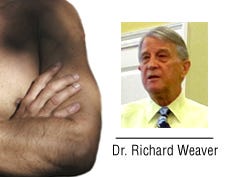
CRESTVIEW — Dr. Richard Weaver has a prescription that addresses numerous medical concerns men can face as they age: eat less, eat healthfully and exercise more.
A healthy diet, exercise and weight loss can reduce men's chances of having prostate cancer, colorectal cancer, hypertension (high blood pressure) and high cholesterol, he said.
Keep reading for common men's health concerns, symptoms, and how you can control the issue>>
Performing regular testicle self-examinations in the shower can help men understand their bodies and help them know when something's unusual, Weaver said during the Crestview Area Chamber of Commerce Scholarship Committee's Thursday Lunch and Learn seminar.
Avoiding high cholesterol could be as simple as eating less red meat and more baked or grilled fish, Weaver said. "If you like that fish that you dip in hot oil (or deep fry), you just lost the benefit" of a low-cholesterol food, he said.
Some conditions, such as increased cholesterol and hypertension, are often simply the result of increasing in age. "A lot of things happen as we get older," he said.
However, exercising 30 or 40 minutes five times a week — even if some of it is taking the stairs instead of an elevator, or parking farther from the store and walking across the parking lot — helps.
"There's a lot of good benefits from a simple walk," Weaver said.
Testicular cancer: Highly treatable when diagnosed early; symptoms include a lump or enlargement in either testicle, sudden collection of fluid or feeling of heaviness in scrotum, dull ache in the abdomen or groin, and pain or discomfort in a testicle or the scrotum.
Prostate cancer: Affects the walnut-shaped, semen-producing gland. Often, there are no symptoms, but there can be dull pain in the lower pelvic area, difficulty urinating, slow or low flow, frequent night-time urination, blood in urine, painful ejaculation, and pain in lower back, hips or upper thighs
Prevention: exercise; eating fruits, vegetables, fiber, garlic, tomatoes, cruciferous vegetables, watermelon and grapefruit; digesting soy products; and limiting high-fat foods
Colo-rectal cancer: Symptoms include change in bowel habits; blood in stool; stools narrower than usual; frequent gas pains, bloating, fullness or cramps; weight loss for no known reason
Prevention: Decreasing red meat intake, eating more yellow, red and orange fruits and vegetables and increasing fiber intake; aerobic exercise four to five times weekly; quit smoking; have regular check-ups after age 40; and have a colonoscopy every three to 10 years after age 50.
Hypertension: Medications such as diet pills, stimulants and decongestants; alcohol intake, kidney disease and obesity; males over 45, women over 55, family history, affects blacks more than other races
Prevention and Control: Maintain healthy weight; limit sodium to one teaspoon per day; limit fast food and pre-processed foods; Eat healthfully, including fruits and vegetables, low fat dairy, low saturated fat and cholesterol; drink alcohol in moderation; quit smoking; exercise 30-40 minutes per day
Skin cancer: results from long-term sun exposure such as outdoor occupations and leisure tanning; sunburn; and heredity
Risk Factors: Affects Anglo-Celtic and Nordic people and those with family history of skin cancer; fair skinned, light haired, blue, green or grey eyes; people who use tanning beds; people with more than 50 moles and freckles
Basal cell: Most common skin cancer; open sores that bleed, ooze, crust, persistent, non-healing; shiny bump or nodule, can be confused with a mole; shiny, taut scar-like area
Squamous cell: Second most common skin cancer; Wart-like growth, usually on sun-exposed area, or persistent scaly red patch that can crust or bleed; open sore that persists for weeks, elevated growth that may rapidly grow in size
Melanoma: Most serious form of skin cancer; small brown-black patches, plaques or nodules with irregular outline, may crust and bleed, may arise from existing mole
Prevention: Do not sunbathe; Avoid unnecessary sun exposure especially between 10 a.m. and 4 p.m.; use SPF 15 or higher sunscreen; wear protective clothes; avoid tanning beds or lamps; teach children good sun protection habits at an early age; examine your skin head to toe every three months
Cholesterol: Total cholesterol should be less than 200 mg; HDL "good" cholesterol should be greater than 40 mg; LDL "bad" cholesterol should be less than 130
Prevention and control: aerobic exercise 40 minutes four or five times a week; change diet to less red meat, low-fat dairy, more fruits and vegetables, fewer fried foods, more fish; maintain normal weight through diet, exercise and lifestyle changes
Source: Dr. Richard Weaver, Clinical Assistant Faculty member, Florida State University College of Medicine
Email News Bulletin Staff Writer Brian Hughes, follow him on Twitter or call 850-682-6524.
This article originally appeared on Crestview News Bulletin: Doctor: Less food, more nutrition and exercise key to men's health
